Last week we discussed beating gas prices by camping close to home. So it seems fitting that in this week’s post we consider what happens when you throw caution to the wind, viciously abuse a few credit cards, and camp FAR AWAY from home. For my wife Kristy and I, the time we spent in Canada’s stunning Banff National Park qualifies. Here are a few thoughts about camping in Canada, with some pesky dollar amounts attached.
[vimeo 610553]
Airstream RV Blog #26 – Banffff from Sean Michael on TheLongLongHoneymoon.com.
Banff is located about 3500 miles from Key West, where we began our “long, long honeymoon” journey. If we do a little fuzzy math (3500 miles traveled at 11.8 miles per $5 gallon of diesel) the total ONE-WAY price tag for this journey is $1483. And if you actually want to return home, this trip will cost $2966 in fuel. Or you could just watch our video for free, and say you’ve been there.
Camping in Canada is truthfully a lot of fun, if not terribly different from camping in the United States. At the border there’s the obligatory Checkpoint Charlie where you’ll be required to answer a few security questions. (YES, you packed your own RV yourself. NO, you’re not transporting any international terrorists in your camper. And most important of all, HECK NO you don’t have any unwashed tomatoes.) If you have a passport, here’s a good place to use it. But if you don’t have one of those fancy little blue booklets, you can brandish a government-issued ID card (and you may be asked for your birth certificate).
Once in Canada you’ll need Canadian money, though you can use your ATM card just about everywhere. When using your card, beware your bank sneaking an annoying “foreign currency conversion” charge onto your account. Banks love to siphon money through these electronic transactions.
As a general rule, prices in Canada seem to be a little higher than prices for the same goods in the United States. Diesel fuel, sold by the liter, is not cheap. For that matter, neither is human fuel like milk and cereal. Draft beer costs about the same per milliliter as liquid plutonium. I don’t know about you, but I feel it should be a violation of international law to charge six dollars for a Coors Light.
Watch out for cellular calls, too. One fateful day, Kristy’s phone rang. It was her parents calling from the United States. We answered the call and enjoyed a brief, pleasant conversation. A couple of months later, a rather unpleasant $28 Canadian surprise appeared on our bill. In a perfect world, I suppose confiscatory roaming charges would be against the law, too.
Campgrounds run the gamut. We stayed at some reasonably priced private campgrounds, and the national parks – such as Banff – were excellent. Our $20 campsite in Banff was really more of a parking space, but the views it afforded were spectacular.
Banff’s famous so-called “hot” springs were actually rather tepid. The natural sulfuric waters were piped into a shallow swimming pool. Building a fancy swimming facility was a noble idea, but somewhere along the way the water’s temperature element was lost. The water was about as warm as room temperature peanut butter. We found far more satisfying (and free) hot springs south of Banff, in British Columbia’s fantastic Lussier Springs.
As for the town, Banff is one of the more scenic and charming little mountain villages we’ve seen. Replete with the requisite “cute” shops and restaurants, it is touristy but not tacky. It reminds me of Jackson, Wyoming – but the views from this town are superior. In Banff you always feel the serene presence of the surrounding mountains. And the local river is filled with glacial runoff, so it’s an almost surreal shade of green.
Is camping in Canada really all that expensive? It depends on how you do it. Sure, if you haul your RV 7000 miles ANYWHERE it’s going to be expensive. But if you live close enough to the Canadian border, I’d say you can visit Canada quite economically. It would probably be a wise policy to COMPLETELY stock your RV with supplies before leaving home.
Costs aside, I must confess that it’s rather exciting to haul one’s RV across the border into another country. Intrinsic in the RV experience is that sense of “home far away from home.” That’s especially true when venturing beyond United States borders. Although you’re leaving your native comfort zone, you’re also towing a piece of it behind you.
But the truth (and please don’t shoot the messenger) is that Alberta, Canada is not radically different from the United States. Most people speak English (although you will hear a little French), share a similar culture, and live a comparable lifestyle. Now, hauling an RV through sub-Saharan Africa or Central Europe would be quite different indeed. Who knows? Perhaps this will be on our honeymoon agenda for next year. 😎
Special thanks to our sponsor: Rvsearch.com. Give ’em a click, will ya?
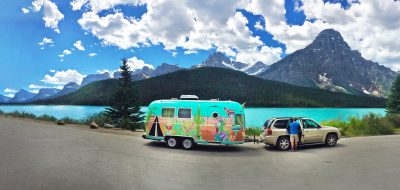
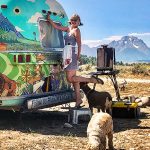
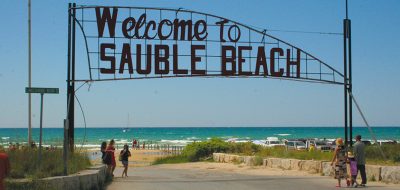

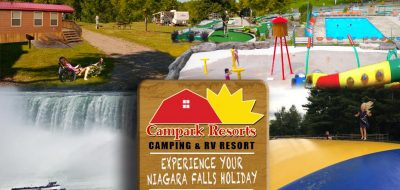
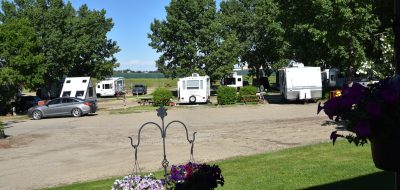
Mark and Lavern Bonds
Hey Guys, We are the new managers at the Fort WIlderness Campground In Cherokee NC. (Actually Whittier NC) only 4 miles out of Cherokee from the reservation and the gorgeous Smoky Mountains. We are in a wonderful secluded area with over 100 sites in the valley of the mountains. We are a year round park and can handle up to 40-45 ft rigs. We have all the amenities the campers would ever want. We take all the discount club members cards for more reasonable camping for a longer stay. We are only 5 minutes from the cherokee reservation, 45 min. – 1 hour from Gatlinburg & Pidgeon Forge. We are 10 min. from the Bryson Train ride which is gorgeous going thru the mountains.
We would love to know how to get many of the groups that travel together to come stay with us. We are open all year round. We know there are many Canadians that travel with a Wagon Master leader that takes the groups on tours thru the states. We would love to be on a tour stop for any of the camping groups that come out east. This campground has been one of the best kept secrets for several years. My wife and I are so excited to be here and are really looking forward to getting the word out. We are currently building a brand new website which will be fantastic. The old one hasn’t been updated for four years and was just thrown together. Feel free to get some what of a look at the campground on http://www.FortWildernessCampground.net . Or you can call my wife or I @ (828) 497-9331 and we will be glad to let you know about us. Hey guys, Please help us get the news out about our campground.
Thanks Mark and Lavern (828) 497-9331.
Claire Harrington
We are on our way to Alaska from North Carolina and for a few bucks I changed my Cell Plan with Verizon to the plan that includes Canada. That way, I can use the phone in Canada for no extra charge and when we return, I can change it back.
Sean
Bill, it sounds like we followed a similar itinerary. We also spent time in Glacier and Waterton (where we had a wonderful time, and enjoyed some great bear sightings) before heading north to Calgary, and then on to Banff. Alas, we didn’t make it to Jasper. We did, however, visit Lake Louise. I’ve gotta say that this planet doesn’t get much more beautiful than those places!
Bill Rowan
Sean good job on your Banff post I enjoyed reading about your trip. We were in the Banff area in June 05 we travled from Glaicer & Waterton NPs up through Banff & Jasper NPs and on to Prince George BC on the way to Alaska. the Banff & Jasper areas were some of the most beautiful in Canada. We didn’t have any trouble crossing the border into Canada or back into USA. We hope to RV back in that area again just have to rack up enough $ for diesel. Its a long way from the TX Gulf to Banff NP
Bill
Sean Michael
Thanks much, Jim. That’s also a good point about bringing proof of vehicle insurance for Canada. Although I’m sure we were toting the magic cards somewhere in our vehicle, we didn’t exactly have them ready to show at the border. Thankfully, our border crossing was a pretty relaxed affair.
Jim Burnett
Sean –
Thanks for an entertaining and informative post. You’re correct – Banff is one of many very scenic areas in Canada. When we lived in Montana, our family camped in several locations in Alberta and British Columbia, and always had a great visit.
My wife and I recently crossed the border between Minnesota and Ontario. Like you, we had our passports, even though there are other ID options for American citizens, plus our proof of vehicle insurance coverage for Canada, and that made things very easy.
Sean Michael
Thanks Neil, I will edit the blog entry to reflect the current passport policy. Kristy and I brought along our passports; I was thinking that in the present border security climate, they were necessary.
I can report that the actual border crossing experience into Canada was very relaxed. The process of reentering the United States was more cumbersome (a longer line, and more questions to answer!).
Neil Cunningham
Great entry and comments. Sorry for your food woes Ruby Ann. If you ever to go Lancaster County again we suggest you try a different campground – Country Haven in New Holland. It is a much more scenic location surrounded by real Amish country, not the tourist traps along the roads in and around Paradise. There is also a wonderful, inexpensive super store called Shady Maple Farm Market about 2 miles from the campground.
Just as an aside – at this time American citizens do not need a passport to enter or leave Canada. You do need a government issued photo id (drivers license) and you may be asked for a birth certificate.
Sean Michael
Brad, it sounds like we have a similar strategy for this year. We are enjoying our RV close to home, while still planning some major excursions to new places. I think our next big trip will be a late summer jaunt to Colorado. Kristy has never been, and the summertime weather is said to be fabulous. I’m sure we will do our fair share of RV tailgating this autumn, too. Then next year we’ll have some MAJOR RV plans. Like you, I’m a big believer in the “carpe diem” philosophy. We have to “seize the day” and pursue our dreams in this life. You are correct in that we can’t really out a price tag on our venture into Canada – it has been one of our most exciting RV experiences so far.
Bob, thanks for your observations with regard to costs. Our impressions are mainly of Alberta (Calgary and Banff) and British Columbia, so we probably have a skewed perspective. Although some items were a little more costly, Canada’s a big country, and we were visiting one of the more expensive regions. Great point about the firearms – LOL. It seems that criminals are never without a gun, while law abiding citizens are being disarmed at the border!
Bob Brady
I enjoyed your comments and thought I would add a few. While that part of the Canada is pretty, it is very expensive at this time due to oil boom. I have travelled into the US and have paid as high as 65.00 a night in NJ. for a site. I have also paid as little as 12.00,full hookups in TX. I guess our fuel is higher at 1.44.9 a litre, or 5.43 a US gal, but that is not that far off as I looked and it close to that in some parts of the US. I too worked all my life for this life style and can’t take it with me so I for one am going to see all the wonderfull sites in both the US and Can., for as long as I can. Our food in this part of Canada is somewhat cheaper than Alberta. We can still buy a loaf of bread for under two bucks. On a final note , remember if you have a wepon on board for protection, even with a license, you must declare it and leave it at the border to be picked up on your return. If you don’t ,you risk losing it and paying a 500.00 fine. I just read that guns at the border are up this year and most are taken from law abiding people who are licensed to carry, but do not declare them. Also if you are travelling through too Alsaka, you need to declare or it will be taken away. I guess our law makers feel safer with no law abiding citizens carring, only the bad guys.
TXBrad
Sean/Kristy: Great stuff & thanks for sharing it w/ us.
Yes, it cost some $$$, but how can youanyone put a price tag on such a great trip & time had. There is no way anyone can do what you all did w.o. an RV ! Plus, I have not found any “caskets” w/ prockets in them to take your money with you.
I am 100% for you all’s travels w/ an RV. I have 100$ + in a motorhome and didn’t work to buy it to camp in my driveway. Like you all: some close outtings for weekendfew days & we plan 1or 2 great ones ( 1 fall +1 spring). Oct. 2007 on US side Canada from NY west great lakes, again there is no price tag on our trip in the Fall! I’ll even openair out the MH on an early morning, have a cup coffee, update log books, maint. records, etc. But, there is so much to see & do out there & I have found no better way than an RV ( bigsmalltowedetc.)
Sean Michael
RubyAnn, that is a great idea about the cooler. In this day and age, I’m almost surprised that all of our vehicles don’t include some sort of built-in cooler / refrigeration. There have been times when Kristy and I have had to race home because we were transporting groceries like meat, ice cream, etc. and they needed to be tucked away into our refrigerator. We really should bring a small cooler along in every vehicle.
RubyAnn Chase
For Canadians,entering the U.S. can present a few problems. When we went to Lancaster County in PA a few weeks ago, we had the RV stocked with everything except for the items we are not allowed to bring in ( fruit,vegetables, and any type of beef,chicken,fish,etc.-fresh, canned, frozen, even cooked). We got to our campground (Mill Bridge on Ronks Rd near Paradise) about 6:00p.m. We went out for our supper because we had no fruit,veg.meat etc. The next day we couldn’t find a grocery store. In fact it was three days later, when on a visit to Intercourse, not only found Harrison Ford’s phone booth from “Witness”, we found a grocery store. Of course we couldn’t buy meat because we hadn’t brought a cooler with us in the truck,and didn’t wish to go home then. A few days later we went to”Green Dragon” where there was everytype of fresh farm produce, but ofcourse were in the same boat. We have added to our”Long Trip”checklist – cooler for truck on day trips. We ended up eating out much more than we intended.
Sean Michael
Thanks Casey, and of course you are correct. Everyone should be mindful of international laws when transporting adult beverages, tomatoes, cilantro, and tree bark across national borders.
Also, on the return trip from Canada, be prepared for some questions about your purchases. Some types of over-the-counter Tylenol, for example, are verboten in the United States. Same goes for old Bryan Adams albums. (Just kidding.)
Kathy, although I’m not aware of such a site, it’s an interesting idea. You might try searching for “boondocking” websites and see what pops up. Most boondocking is free, although some dry camping may carry with it a small site rental fee.
Don, you make a good point about cellphone usage on BOTH sides of the border. Next time I’m using Skype! As for the beer, we have some nice microbrews in the States but I must concede that they usually aren’t cheap.
Don Eyre
I took my my Canadian cellphone to the US and I didn’t get treated a damn bit better there than you did here. 95 cents a minute!!!! and a good single malt Scotch is just as expensive in the US as here. Your beer is cheaper but then it doesn’t have much taste either.
Kathy Misener
Hello; I was wondering if there is a website where RV’ers can rent acerage to park their Rv’s on. Something like the equilivent to VRBO (Vacation Rentals by Owners) for people who want to vacation rentals.
Casey Donovan
That advice to completely stock your RV with supplies before crossing the border into Canada may be good economics — unless “completely” means major quantities of alcoholic beverages. Quoting About.com’s website:
“If you are of legal drinking age (the drinking age in Canada is either 18 or 19 depending on the province), you are allowed to bring in, free of duty and taxes, either 1.5 litres of wine, or 1.14 litres (40 ounces) of liquor, or 24 x 355 millilitres (12 ounces) cans or bottles (8.5 litres) of beer or ale.
If you bring in more than this amount, it will cost you in both customs assessment and provincial / territorial taxes.”